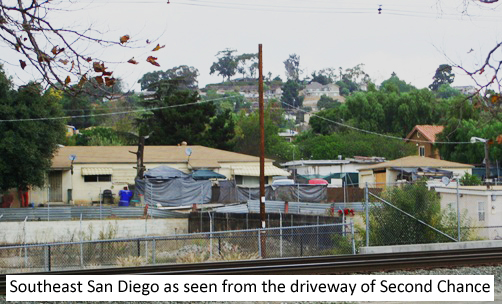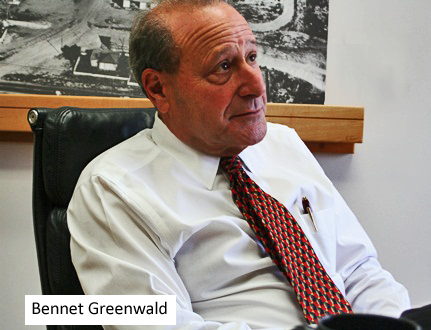
Southeast San Diego is a historically black neighborhood that today includes a majority Latino population with growing subgroups of refugees and asylum seekers from North Africa and the Middle East, along with pockets of ethnic Samoans and Southeast Asians. It could be described as a diverse, working-class neighborhood. It could also be described as a ghetto. Average household income in the area is half that of San Diego as a whole. The violent crime rate per capita is nearly twice San Diego's citywide average. Unemployment in some census tracts exceeds 20 percent. More than half of all children in the area live below the official federal poverty threshold.

Guns, gangs, drugs and blight are the backdrop of the Southeast social tableau. The neighborhood is a catch drain for the cast-off and overlooked. It is the other San Diego, the one you fly over on your way in for a four-day weekend of beaches, cocktails and trained whales. Nobody chooses Southeast San Diego -- they just end up there. From a few stories above street level one can see the skyline of Downtown, but the affluence and excess in those high-rise silhouettes are a world away. In Southeast San Diego one grows up fast, gets wise early and gets by the best one can.
It's the sort of place you would expect to find a charity focused on the problems of homelessness, joblessness, addiction and recidivism. It's not at all the sort of place you'd expect to find Bennet Greenwald.
Greenwald is the founder and president of The Greenwald Company, a real estate concern that develops and manages commercial, industrial and residential properties with a total asset value in excess of $500 million. An authoritative man of Midwest styling, Greenwald exudes erudition. What he doesn't know about could be written on a matchbook. Data are his friends and his best data friends are those that indicate a positive return on investment. He happens to be the Chairman of the Board of Second Chance, a nonprofit organization based in Southeast San Diego offering an array of services for men, women and youth with needs too numerous to list.
If you ever find yourself with an afternoon to kill, ask Greenwald if he knows the time. You'll learn the theory and history of chronometry going back to the Sumerians. One does not listen to Bennet Greenwald; one partakes of him. I asked him recently why a successful man in the third trimester of life would volunteer his time, talent and treasure to overseeing an organization that offers nothing to his bottom-line. I was prepared for a lengthy response.
"In what is still the richest country in the world, for people to beg on the streets, sleep on the streets, is an outrage," he said, adding, "We should be ashamed of ourselves as a culture. We have become a society defined by selfishness, greed and love of corporate economics. We know, whether or not we're willing to admit it, that capitalism is selfish and that corporations eat their children. The only thing that can redeem this culture is awareness of the fact that if your ox is gored, so is mine."

As I thought to myself, 'But you're a rich guy...' he quickly emphasized, "I can't just sit on my sailboat and enjoy myself knowing there are beggars at our gates and I did nothing about it. I couldn't look at myself in the mirror if I didn't do something."
In his capacity as the Second Chance Board Chairman, Greenwald does something many hours each week. He heads a group of 17 board members that includes business owners, executives and academics from some of San Diego's leading companies and institutions. The Board also includes the County Sheriff, District Attorney and Chief of Police. As a group, they're an impressive assortment, but none moreso than Greenwald, the grandson of Russian Jews, a product of Chicago's public education system, and a self-made man with an inherited immigrant work ethic.
"In my family," he told me, "we get up and go to work. It's what we do."
Greenwald believes that the involvement of so many successful professionals on the Second Chance Board reflects their common commitment to helping others find it within themselves to get up and go to work, and to providing them a chance to do just that. Second Chance serves some 1,500 men, women and youth each year, offering transitional housing, job preparation and placement, mental health services, education and on-the-job training, all focused on making self-sufficiency through employment a reasonable goal for people whose backgrounds bar the way to the sort of life most of us take for granted. It's a difficult mission for an organization whose clients include chronic substance abusers, serial offenders, people with little or no formal education, victims of violence and other special needs groups.
In addition to his work with Second Chance, Greenwald serves on the Board of Directors of the Monarch School, an organization working in partnership with San Diego's public school systems to educate children affected by homelessness. Says Greenwald, "I have prospered in part because every day I got up and went to work, but I was graced with such good fortune, it's a pleasure for me to give back to those who have it so much worse. I give back by serving organizations that are attacking homelessness by identifying education and work as the means to escape poverty."
Greenwald is not content with unsupported claims about his organization's work. He demands evidence. At the helm of Second Chance he led a search committee that brought in the organization's Executive Director, Robert Coleman, who was selected in part for his past success with other nonprofits in Southern California and his native England. Greenwald demands proof of outcomes and will not abide statements without data. He has charged Coleman with finding data to support any claims Second Chance might make.
"For instance," said Greenwald, "if it is the fact that Second Chance finds employment for 500 people per year, and if it is the fact that those 500 people pay taxes, participate in the local economy, etc., then with a budget of just $3 million, we returned $6 million worth of benefit to the community and I can live with a 100 percent return on investment."
The math is kind of tricky, but if one accepts that it costs $47,000 a year to keep a person in a California prison and if one accepts as given a certain cost to public institutions and private enterprise of a population out of work and dependent on support, it's easy to reach a bottom-line that makes Greenwald's estimate seem conservative.
While most non-profit organizations track their services and achievements, there is something novel about the sort of outcomes Greenwald expects to see. He asks not only, "How many people got jobs?" he asks also, "And as a result, how much better off is the community as a whole?" Greenwald believes there are some problems that are cheaper to solve than to ignore and he believes that solving them is not just the right thing to do; it's also the smart thing.
He told me, "For example, 40 years ago we declared war on drugs, a Nixon fiasco, and since then we have spent hundreds of billions of dollars on a policy that saps the strength of our public servants, clogs our courts, depletes our public treasury and harms our foreign relations but affects addict behavior not a dime's worth."
"We now understand that there is a genetic predisposition to the disease of addiction, that some 10 percent of us suffer from it and that virtually every family in the United States is touched by it directly or indirectly. Everyone has a friend, family member, co-worker or acquaintance plagued by addiction and we do almost nothing at the public policy level to address the real problem. Instead we keep more than two million Americans locked up in a prison system that we can't afford, that does no good and deprives our culture of dignity."
In the field of social service, the kind of data Greenwald looks for is data that can show lasting outcomes, changed behavior, improved prosperity and safer communities. "Claims are valid if they're backed by measurement," he said. "Without measurement they're just noise, a palliative for well-meaning hearts."
At Second Chance, Greenwald's vision is working and it's drawing attention. Second Chance was recently named one of San Diego Metro's 20 Most Admired Companies and has received coverage in print and online media, including The Huffington Post, for its unique approach and impact. One of the organization's programs was also featured in a recent documentary series on the Sundance Channel (click here to see episode one of eight).
It's a small difference to be sure -- if there were a hundred more Second Chances they might meet the extent of need in San Diego. Thousands might make a dent nationwide. As it is, the Board and staff take comfort in knowing each day they leave things better than they found them, if only incrementally.
Greenwald's voice lowers and he shifts in his seat when asked about his own impact. "It's a part of me to share what I have. It's deep within me. Just something I do and don't think about. But I'll tell you this: A society dedicated to nothing but wealth is a poor society. It is a society that creates social conditions that breed segregation, distrust, anger and violence. That's not a society I want to be a part of."
There might never be a statue of Bennet Greenwald but if there is and it depicts him with a crystal ball in one hand, it should include a ledger sheet in the other. He can see what is easily missed in our jaded times; it makes good fiscal sense to do the right thing. Of course, regardless of the pay-off, if it changed one life, if it rebuilt one family, if it kept one teenager from becoming a statistic, if it helped just one person, for Greenwald it was worth it. That it helps so many more is a testament to Bennet Greenwald and the devoted members of the Second Chance Board of Directors. Because of them, opportunity is working in San Diego.
*The 2012/13 Second Chance Board of Directors includes:
Bennet Greenwald, The Greenwald Company, Chairman
Stephen Chin, Sharp Health Plan
Bonnie Dumanis, San Diego County District Attorney
Angie Elsbury, Vons
Jennifer Forman, Mitchell International
William Gore, San Diego County Sheriff
Edward Hidalgo, Qualcomm
Dr. Igor Koutsenok, University of California San Diego
M.G. Kristian, Mitchell International
William Lansdowne, San Diego Chief of Police
Claudine Larreur, LPL Financial
Judy Lawton, The Lawton Group
Greg Markow, Markow Law Group
Jessica Mosier, San Diego Workforce Partnership
Marianne Nelson, Wells Fargo
Jason Shidler, First Republic Bank
Kenneth Van Damme, RPR Partners
Heather Whitley, Manpower
To find out more about the work of Second Chance call (619) 234-8888.
